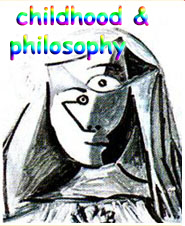conhecer os jovens “onde eles estão": demonstrando suas vantagens.
DOI:
https://doi.org/10.12957/childphilo.2019.45887Palavras-chave:
ensino não hierárquico, treinamento de futebol, ensino não autoritário, filosofia para crianças.Resumo
Quando Matthew Lipman introduziu a Filosofia para Crianças (P4C) no mundo, seu objetivo não era introduzir um pouco de filosofia acadêmica no currículo escolar típico, como seria de esperar dos títulos de seus primeiros livros: Philosophy in the Classroom (Lipman et al. al., 1980) e Philosophy Goes to School (Lipman, 1988). Seu objetivo, antes, era criar uma mudança de paradigma no próprio campo da educação: transformar o modelo hierárquico típico em um modelo em que o professor/facilitador solicitasse respostas dos alunos e, nesse sentido, encontrasse-os onde eles “estão”. Este modelo não hierárquico, no entanto, tropeçou em criar raízes, o que talvez não seja surpreendente, uma vez que o modelo hierárquico, seja na escola, no esporte ou em casa, parece ser muito mais fácil e muito mais eficiente. Cabe aos que apoiamos um modelo não hierárquico em todas essas arenas e levamos a sério essa abordagem articularmos precisamente de que maneira um modelo hierárquico fica aquém. Ao fazer isso, forneceremos não apenas uma estrutura precisa para defender a importância de adotar uma abordagem não hierárquica, mas também forneceremos uma medida pela qual poderemos medir se nossa própria prática não hierárquica é fiel à sua justificativa; e que a abordagem não é simplesmente não hierárquica por não ser hierárquica, nem quase autoritária para ter uma aceitação mais ampla. É a articulação das falhas de um modelo hierárquico que o modelo não hierárquico pode (e deve) corrigir o foco da nossa análise.
Downloads
Referências
Arendt, Hannah. (1958/2013.) The Human Condition. Chicago: University of Chicago Press.
Robert A. Burton. (2008) On Being Certain: On Believing That You Are Right Even When You Are Not. New York: St. Martin’s Griffin.
Buber, M. (1958). I and Thou. 2nd Ed. New York: Charles Scribner’s Sons.
Freire, Paulo (2018) Pedagogy of the Oppressed, New York, NY: Bloomsbury Publishing.
Friedman, Thomas L. (2005) The World is Flat: A brief History of the Twenty-First Century. New York: Farrar, Straus and Giroux.
Gardner, Susan T. (2011) “What Would Socrates Say to Mrs Smith?” Philosophy Now. Issue 84. May/June 24-26.
Gardner, Susan T. (2015) Inquiry is no mere conversation. First published in The Australian Journal for Critical and Creative Thinking, Vol. 3, No. 2, October, 1995, pp. 38-49. Then in Analytic Teaching, April 1996, Vol. 16, no. 2, pp. 41 – 50. Finally, in Journal of Philosophy in Schools 2(1), 2015. 71-91
Gardner. Susan T. and Daniel J. Anderson. (2015) “Authenticity: It Should and Can Be Nurtured,” Mind, Culture, and Activity. 22 (4) (Oct.): 392-401.
Gardner, Susan T. And Wolf, Arthur.(2019) “Thinking And Knowledge, The Past And The Future: An Energized Mesh.“ (Under consideration.)
Guru, T.G. (n.d.). Germany focus on ‘fun and joy’ to reverse decline. Retrieved from
http://trainingground.guru/articles/germany-focus-on-fun-and-joy-to-reverse-decline
Habermas, J. (1992, German text 1981) The Theory of Communicative Action. (TCA) Vol. 1: Reason and the Rationalization of Society. Trans. Thomas McCarthy. Boston: Beacon Press.
Kennedy, David (2006) The Well of Being: Childhood, Subjectivity, And Education.
Albany: State University of New York Press.
Lehrer Jonah (2010). How We Decide. New York: Mariner Books.
Kohan, Walter Omar. (2011) “Childhood, Education and Philosophy: Notes on Deterritorialisation.” Journal of Philosophy of Education, Vol. 45, No. 2. 339-357.
Lipman, Matthew, Ann Margaret Sharp, Frederick S. Oscanyan. (1980) Philosophy in the Classroom. Philadelphia: Temple.
Lipman, Matthew. (1988) Philosophy Goes to School. Philadelphia: Temple.
Lipman, Matthew. (1991) Thinking in Education. Cambridge: Cambridge UP.
Merkel. D. (2013). Youth sport: Positive and negative impact on young athletes. Open Access Journal of Sports Medicine, 151. Doi:10.2147/oajsm.s33556.
Schertz, Matthew. (2007) “Avoiding ‘passive empathy’ with Philosophy for Children.” Journal of Moral Education Vol. 36, No. 2, June, pp. 185–198.
Sharp, Ann Margaret (2004/2018) “The Other Dimension of Caring Thinking.” In Community of Inquiry with Ann Margaret Sharp: Childhood, Philosophy, and Education. Edited by Maughn Rollins Gregory and Megan Jane Laverty. New York: Routledge.
Thoreau, Henry David (1910). Walden. N.Y. Thorny Cromwell.
Wolf, Arthur and Susan T. Gardner. (2018) “An Education for “Practical” Conceptual Analysis in The Practice of “Philosophy for Children.” Analytic Teaching and Philosophical Praxis. Fall.




